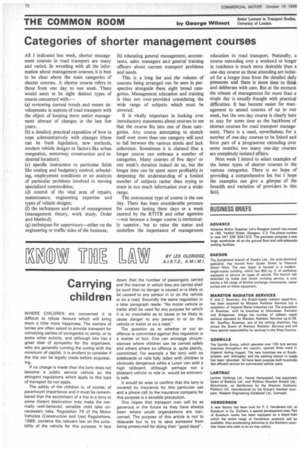Categories of shorter management courses
Page 74

If you've noticed an error in this article please click here to report it so we can fix it.
AS I indicated last week, shorter management courses in road transport are many and varied. In wrestling with all the information about management courses, it is best to be clear about the main categories of shorter courses. A shorter course refers to those from one day to one week. There would seem to be eight distinct types of course concerned with:—
(a) reviewing current trends and recent developments in aspects of road transport with the object of keeping more senior management abreast of changes in the last few years; (b) a detailed, practical exposition of how to cope administratively with changes (these can be fresh legislation, new methods, modern vehicle designs or factors like urban congestion, motorway construction and industrial location); (c) specific instruction in particular fields like costing and budgetary control, scheduling, employment conditions or an analysis of particular problems involved in moving specialized commodities; (d) control of the vital area of repairs, maintenance, engineering expertise and types of vehicle designs; (f) the techniques and tools of management (management theory, work study, Order and Method); (g) techniques for supervisors—either on the engineering or traffic sides of the business; (h) educating general management, accountants, sales managers and general training officers about current transport problems and needs.
This is a long list and the volume of courses being arranged can be seen in perspective alongside these eight broad categories. Management education and training is thus not over-provided considering the wide range of subjects which must be covered.
It is vitally important in looking over introductory statements about courses to see that the course fits into one of these categories. Any course attempting to stretch itself over more than one category will tend to fall between the various stools and lack coherence. Sometimes it is claimed that a longer course can embrace a number of categories. Many courses of five days' or one week's duration indeed do so, but the longer time can be spent more profitably in deepening the understanding of a limited number of subjects rather than trying to cram in too much information over a wider range.
The commonest type of course is the one day. There has been considerable pressure for courses lasting three days or a week exerted by the RTITB and other agencies —not because a longer course is intrinsically superior, but to raise the status and underline the importance of management education in road transport. Naturally, a course extending over a weekend or longer in residence is much more desirable than a one-day course as those attending are isolated for a longer time from the detailed daily pressures and there is more time to think and deliberate with care. But at the moment the release of management for more than a single day is usually fraught with practical difficulties. It has become easier for management to attend courses of up to one week, but the one-day course is clearly here to stay for some time as the backbone of shorten courses for road transport management. There is a need, nevertheless, for a number of one-day courses to be linked and form part of a programme extending over some months; too many one-day courses are completely isolated affairs.
Next week I intend to select examples of the better types of shorter courses in the various categories. There is no hope of providing a comprehensive list but I hope the examples can give a glimpse of the breadth and variation of providers in this field.
























































































































